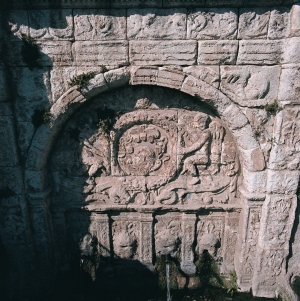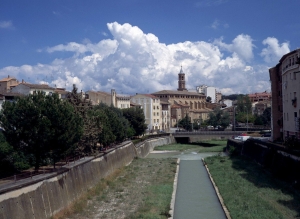The birthplace of the Argensola brothers is found in Barbastro, in the palace that bears their name.
At the beginning of the 16th century, Pedro Leonardo de Argensola, a descendent of the Italian noble house of Rávena, arrived in Spain and placed himself in the service of Fernando “El Católico”. He later moved to Barbastro.
His grandsons, Lupercio and Bartolomé Leonardo de Argensola, who were fond of archaeology and spoke fluent Latin, became the best representatives of classic poetry of the era, halfway between the 16th and 17th centuries.
Both men gained the favour and admiration of Lope de Vega (poet and playwright) who said of them; “It appears they come from Aragon to reform the Castilian language of our poets.”
Lupercio Leonardo de Argensola (1559-1613) was the Aragon Chronicler; in Madrid he was secretary to Empress Maria of Austria and in Naples, secretary to Virrey. His poetry is moral and philosophical, sober, serious and unsensual. In fact, none of his romantic sonnets make reference to intimate feelings. Lupercio’s criticism of the constant romantic complaints of Lope de Vega’s poems resulted in him dedicating an audacious verse to his rival.
In addition to poetry, he wrote plays such as La Filis, La Isabela and La Alejandra. Cervantes made reference to these in his book, Don Quijote:
'Tell me, do you not recollect that a few years ago, there were
three tragedies acted in Spain, written by a famous poet of these
kingdoms, which were such that they filled all who heard them with
admiration, delight, and interest, the ignorant as well as the wise,
the masses as well as the higher orders, and brought in more money
to the performers, these three alone, than thirty of the best that
have been since produced?'
"'No doubt,' replied the actor in question, 'you mean the
"Isabella," the "Phyllis," and the "Alexandra."'
In his plays there is never a moment of happiness and plenty of death; in fact in Alexandra everyone dies.
Bartolomé Leonardo de Argensola (1561-1634) was priest, chaplain to the Empress and Aragon Chronicler upon the death of his brother. He wrote Conquista de las Islas Molucas a book that was even translated into English. At the University of Salamanca he got to know Fray Luis de León and in Rome he met Galileo. More cultured and refined than his brother, he became a terrible critic of the vices of the era, of certain feminine customs and even of lawyers through his satirical poems.





































